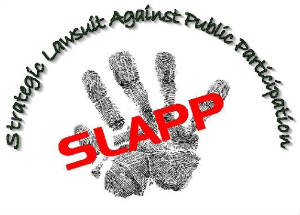
Attorney Eric Turkewitz writes about his experience with SLAPP suits in New York. (SLAPP = Strategic Lawsuit Against Public Participation) Although the law protects people who write truthful things and/or state their opinions, the legal process of getting a case dismissed is onerous without anti-SLAPP laws. (Even with anti-SLAPP laws, it can still be expensive. Medifast sued in California, where there is good anti-SLAPP legislation, but it still took over $300k in attorneys fees — not counting the hundreds of thousands of dollars the other defendants spent on their attorneys — and over four years of litigation to get the suit against me dismissed.)
Eric was sued twice for reporting about courtroom activities on his blog. Both cases had no merit, but the plaintiffs walked away without penalty, and Erik was forced to spend a tremendous amount of time on his defense. (And had he not been a lawyer, he would have had to spend a tremendous amount of money on his defense.)
This might not sound like a big deal unless you’re on the receiving end of such a lawsuit. You might think that the answer is for people to stop talking and writing about controversial things. But why should we? Why can’t I, as a forensic accountant and fraud investigator, write about things that I think are scammy or fraudulent without the fear that I’ll be sued for reporting facts or my opinion?
In his article, Eric talks about Rakofsky v. Internet. One Joseph Rakofsky’s competence as an attorney was questioned by the court during a murder trial. Multitudes of bloggers wrote about the case, as it was of interest to the legal community. That resulted in a lawsuit against about 80 parties, including Eric. Mr. Turkewitz was also sued for his reporting on the case of Dr. Michael Katz and the fact that a judge repeatedly called him a liar in open court.
Both cases against Eric were dismissed, but neither plaintiff received any sanctions for trying to suppress free speech. In states without anti-SLAPP laws, there is virtually no incentive for plaintiffs to ensure that their claims are supported by the law. That is, the plaintiffs know full well that the law is not on their side, but they still file their lawsuits because there is essentially no downside for them. At worst, their cases will get thrown out of court. At best, the targets of their lawsuits may remove material from the internet, agree not to write about the plaintiffs again, or some other action that suppresses free speech.
The answer is to get anti-SLAPP laws on the books in each and every state. Marc Randazza was successful in helping Nevada to get anti-SLAPP legislation on the books in Nevada, and is advocating that others do the same in their states.



